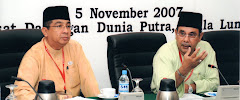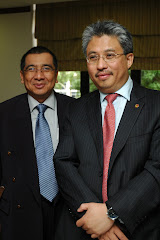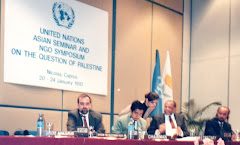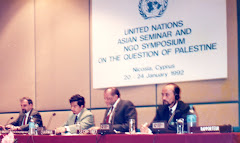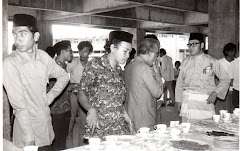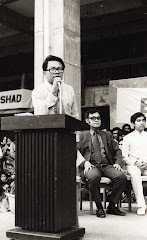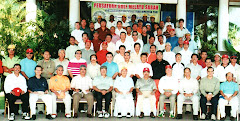Najib’s Political Battles Pose a Challenge to his Foreign Policy Agenda
By Murray Hiebert, (@MurrayHiebert1), Senior Fellow and Deputy Director, and Nigel Cory, Researcher, Sumitro Chair for Southeast Asia Studies (@SoutheastAsiaDC), CSIS
Challenges at home suggest Malaysian prime minister Najib Razak could face an uphill battle in pursuing his foreign policy goals in the year ahead. The long-simmering battle between Najib and former prime minister Mahathir Mohamad has erupted into a public spat that must have Najib looking over his shoulder given Mahathir’s role in ousting his predecessor, Abdullah Badawi.
As a result Najib finds himself flanked on the right by Perkasa, the equivalent of the Tea Party within his ruling United Malays National Organization (UMNO), and on the left by the opposition coalition led by former deputy prime minister Anwar Ibrahim. No move Najib makes will please all Malaysians, and perhaps not even many, in this constrained environment.
The public mudslinging between Najib and Mahathir could weaken and distract the prime minister even as 2015 presents opportunities for Malaysia to make its mark on the international stage. Malaysia’s ruling party generally hides internal conflict from public view. But the escalation in political maneuvering between two of the party’s key leaders has changed this dynamic.
Old corruption charges have been rehashed against Daim Zainuddin, an outspoken critic of Najib. Daim is an UMNO insider, financial powerbroker, and two-time finance minister under Mahathir. He is seen as a proxy for the former prime minister and, to real insiders, may even be the one pulling the strings on his former boss. The government-controlled media took the unusual step of covering the case against Daim in detail, which some interpreted as a coordinated political attack and which prompted proxies on both sides to take the fight to the Internet.
The split between Najib and Mahathir burst into the open when the latter, now 89, publicly withdrew his support for Najib in an August 2014 blog. Mahathir blamed Najib for the ruling coalition’s poor showing in the 2013 national elections, attacked him for his efforts in 2011 to abolish the draconian Internal Security Act, and criticized his earlier plans to scale back the affirmative action program that provides special privileges for the country’s Malay majority. On all these issues, Mahathir has strong support from UMNO’s most conservative wing.
The bitter dispute between the two men and their respective camps appears to have picked up in earnest after a dinner between them in December did not go well. A thorny issue reportedly discussed at the meeting was the sovereign fund 1Malaysia Development Bhd., which has been plagued by charges of mismanagement and corruption and is reportedly suffering from billions of ringgit in nonperforming loans. Najib is chair of the fund’s advisory board.
Mahathir retains significant public and political influence in Malaysia as an elder statesman, particularly among conservative Malays. His profile stems from enduring public popularity, especially among older members of society who are nostalgic about his 22 years in power. Mahathir’s political influence within UMNO has loomed large over his successors since he stepped down in 2003. He leveraged this influence to undermine and ultimately remove his anointed successor, Abdullah, in 2009. Then-deputy prime minister Najib stepped up to become prime minister. He most certainly sees the possibility of history repeating itself.
And Malaysia’s economy is not going to provide any respite for Najib. The sharp drop in oil prices has created some stiff headwinds for Malaysia’s economy. Oil and gas exports account for a fifth of the country’s exports and a third of government revenue. It was therefore little surprise that Najib on January 20 announced $1.5 billion in spending cuts and said Malaysia’s economic growth has been revised down from 6 percent to between 4.5 and 5.5 percent for 2015.
Under withering attacks from Mahathir and party conservatives, Najib has backed off many of his earlier political and economic reform plans. In recent months, his government has been criticized by the United States and human rights organizations for repeatedly using the colonial-era Sedition Act against critics. Anwar Ibrahim is awaiting a court verdict on another round of sodomy charges that could once again see him sent to prison. The verdict, expected in the next few weeks, would undoubtedly lead to further criticism from the international community.
Najib’s domestic challenges could pose risks for his foreign policy goals in 2015. This year is shaping up as an important one for Malaysia given its chairmanship of ASEAN and its non-permanent seat on the UN Security Council. As ASEAN chair, Malaysia can be expected to play a key role in pressing the grouping to take steps to complete regional economic integration, keep tensions in the disputed South China Sea under control, and explore ways to bolster the role of the East Asia Summit.
Negotiators of the 12-nation Trans-Pacific Partnership (TPP), which Malaysia joined in 2010, are scrambling to complete the trade agreement by March. But for Malaysia to get to the finish line will require some tough decisions by Najib and his cabinet in such areas as state-owned enterprises, pharmaceuticals, and investor dispute mechanisms. Even before his latest broadsides against Najib, Mahathir, who oversaw Malaysia’s earlier transformation into an industrial powerhouse, had sharply criticized the TPP as an attempt by foreign powers to colonize Malaysia. Anwar and the opposition have also sought to foil Najib’s reform efforts.
The coming months could provide an opportunity for Malaysia and the United States to put more substance into the comprehensive partnership they announced last April when President Barack Obama visited Malaysia. But the visit marked only the beginning of the process, which requires more work by both sides to achieve deeper ties, including such things as stepped up cabinet-level exchanges, more military cooperation and intelligence sharing, and closer economic ties.
Najib’s golf outing with Obama in early January showed the depth of personal comradery between the two leaders, which could help them achieve greater depth to the comprehensive partnership before Obama visits again in November. However, the sharp criticism Najib received for golfing in Hawaii while parts of Malaysia faced terrible flooding highlights some of the challenges he could face in the months ahead as he seeks to deepen the country’s regional and global foreign policy opportunities.
The United States will need to make some tough decisions in the coming months about how to engage Najib and Malaysia. The country is a vital partner and a key to strengthening ASEAN. The White House will face pressure from various advocacy groups to limit or curtail engagement and there will be congressional pressure during the TPP approval process. The administration will have to step carefully but be guided by the strategic need to support political and economic reform in Malaysia. For his part, Najib will need to harden his resolve to pursue that reform.






























